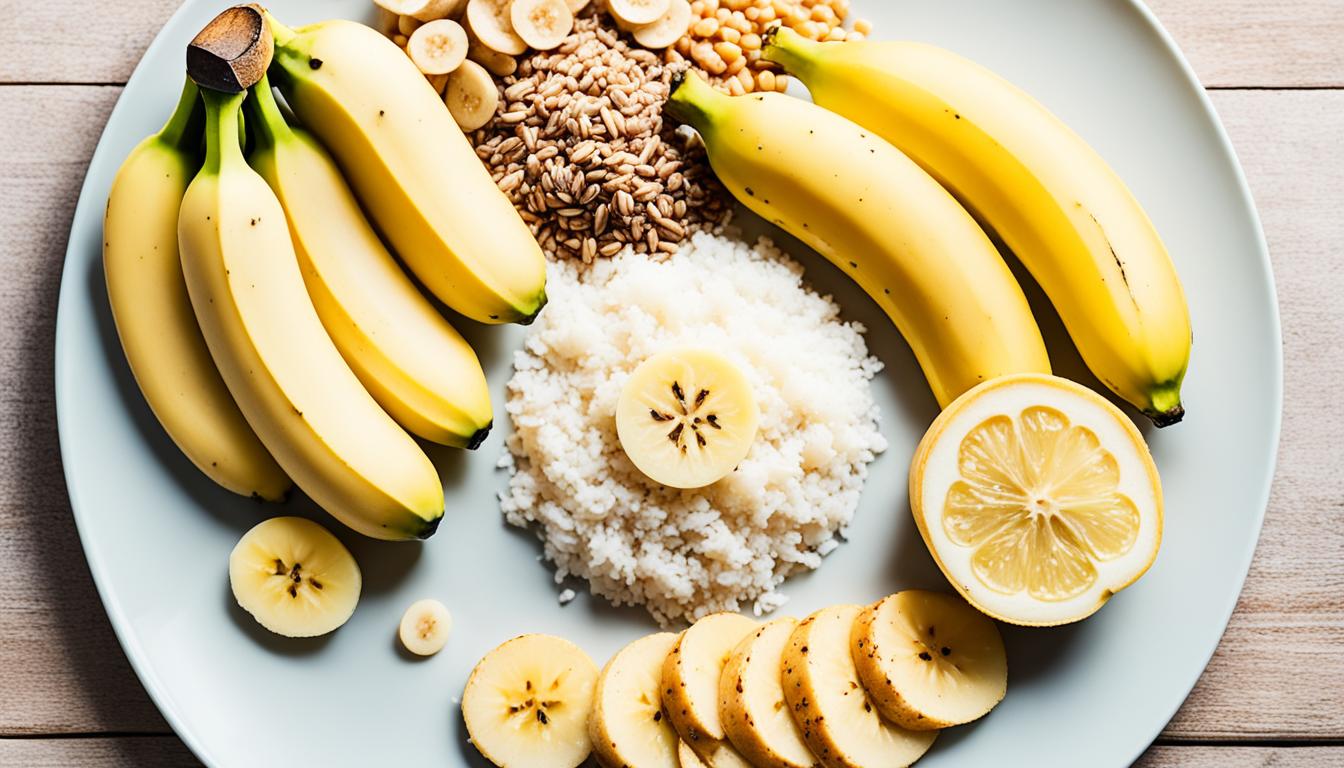When you have diarrhea, certain foods can help your digestive system get back on track and promote a quicker recovery. The BRAT diet, which stands for bananas, rice, applesauce, and toast, is a commonly recommended diet for diarrhea. These foods are bland, low in fiber, and binding, which can help firm up stool. In addition to the BRAT diet, other foods that can be included in a diarrhea-friendly diet are cooked cereal like oatmeal, soda crackers, apple juice low in added sugar, and baked or boiled potatoes.
It is also important to stay hydrated by drinking plenty of fluids like water, clear broths, electrolyte-enhanced water, and weak, decaffeinated tea.
However, there are also certain foods that should be avoided when you have diarrhea, such as milk and dairy products, fried and fatty foods, spicy foods, processed foods with additives, and certain fruits and vegetables.
It is recommended to follow a modified diet, increase fluid intake, and consider over-the-counter anti-diarrheal medications if necessary. Severe or prolonged cases of diarrhea may require medical attention.
List of Foods to Eat When You Have Diarrhea NHS
Best Foods for Upset Stomach and Digestive Issues
When dealing with an upset stomach and digestive issues like diarrhea, it’s important to choose foods that can provide relief and promote better digestion. Opting for bland, easily digestible foods can soothe stomach irritation and settle your stomach. Here are some of the best foods to include in your diet when you’re experiencing digestive issues:
- Bananas: Bananas are gentle on the stomach and rich in potassium, which can help replenish electrolytes lost due to diarrhea.
- White Rice: White rice is easy to digest and can help bind your stool, making it a great choice for upset stomachs.
- Applesauce: Applesauce is low in fiber and provides essential nutrients, making it a soothing option for digestive issues.
- Toast: Plain toast, especially made from white bread, is gentle on the stomach and easy to digest.
In addition to these foods, cooked cereal like oatmeal, soda crackers, and baked or boiled potatoes can also be included in a diet for digestive issues. It’s important to choose foods that are low in fiber to minimize irritation and avoid foods that may aggravate symptoms, such as fried, fatty, and spicy foods. Ensuring adequate hydration is crucial, so drink plenty of fluids like water and clear broths.
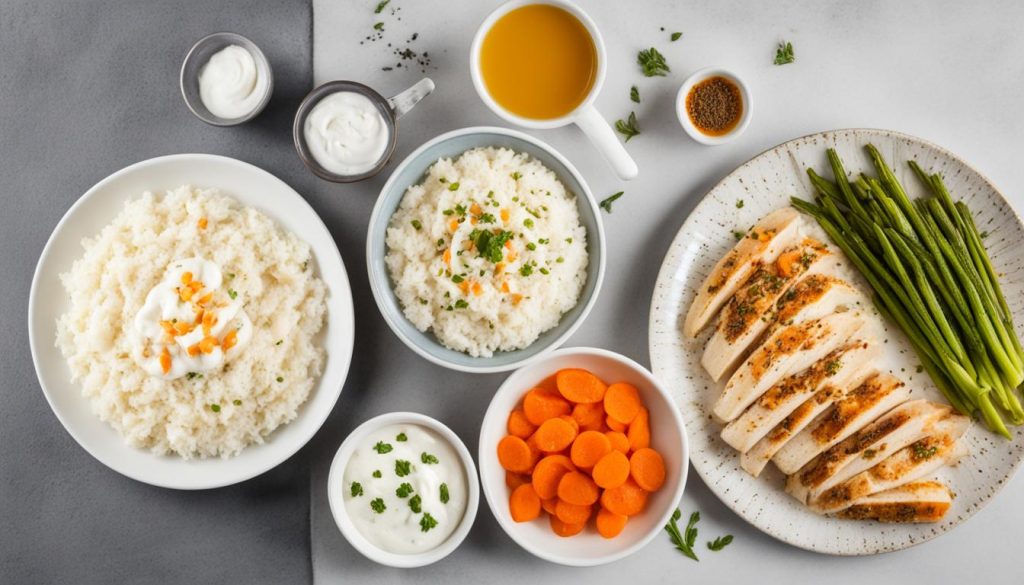
Replenishing Fluids and Staying Hydrated
Diarrhea can cause dehydration, so it is important to replenish fluids and stay hydrated. Drinking plenty of liquids can help replace lost fluids and prevent dehydration. Opt for the following easy-on-the-stomach fluids and foods to eat for diarrhea relief:
Liquids to Replenish Fluids
- Clear broths: Vegetable, chicken, or beef broths with grease removed
- Water or ice chips
- Electrolyte-enhanced water or coconut water with vitamins or electrolytes (avoid ones high in sugar)
- Solutions like Pedialyte
- Weak, decaffeinated tea
Avoid caffeinated and carbonated drinks, alcohol, and artificially sweetened beverages as these can exacerbate digestive issues.
Gentle Foods for Digestive Issues
In addition to fluids, it is also important to consume foods that are easy on the stomach and gentle on the digestive system. Incorporate the following foods into your diet for digestive issues:
| Food | Description |
|---|---|
| Bananas | Rich in potassium and gentle on the stomach |
| Cooked cereal | Oatmeal or other cooked cereals that are low in fiber |
| Soda crackers | Easy-to-digest crackers that can help settle the stomach |
| Baked or boiled potatoes | Starchy and gentle on the digestive system |
Incorporating these gentle foods into your diet can help calm your stomach and promote easier digestion. Remember to listen to your body and choose foods that work best for you.
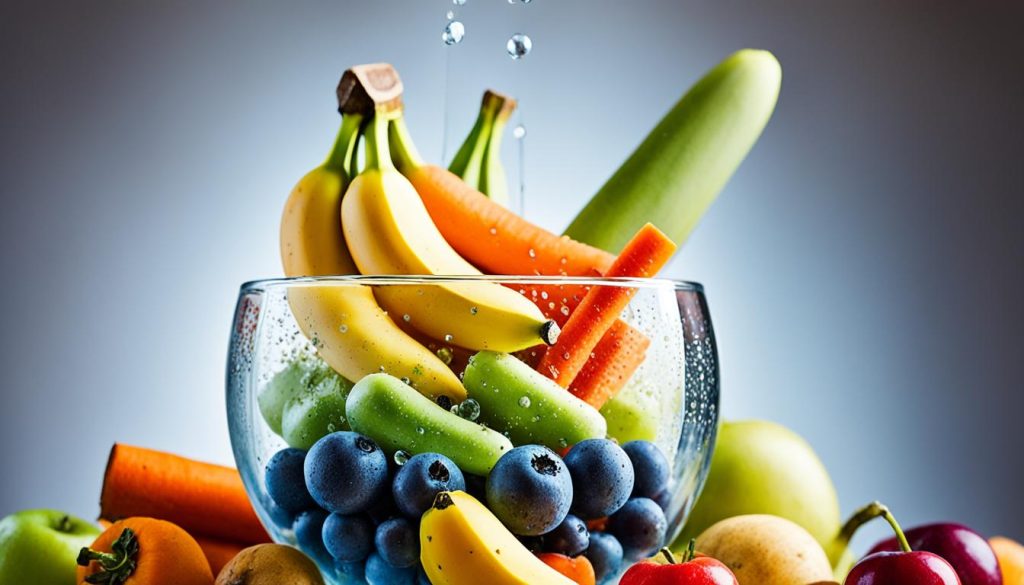
Foods to Avoid During Diarrhea
When experiencing diarrhea, it is important to be mindful of the foods you consume. Certain foods can aggravate symptoms and prolong the duration of diarrhea. To promote a healthy diet for diarrhea, it is best to avoid the following:
- Milk and dairy products: Dairy can be difficult to digest and may worsen diarrhea.
- Fried, fatty, and greasy foods: These foods can irritate the digestive system and worsen diarrhea.
- Spicy foods: Spices can stimulate the digestive system and increase discomfort.
- Processed foods with additives: These foods may contain ingredients that can further upset the stomach.
- Pork and veal: These meats can be heavy on the digestive system and cause digestive upset.
- Sardines: Sardines are high in oily fats, which can worsen diarrhea.
- Raw vegetables: Raw vegetables are high in fiber and can be difficult to digest during diarrhea.
- Onions: Onions can cause gas and bloating, aggravating diarrhea symptoms.
- Corn: The high fiber content in corn can be tough on the digestive system during diarrhea.
- Citrus fruits: Citrus fruits are acidic and may irritate the digestive system.
- Other fruits like pineapples, cherries, seeded berries, figs, currants, and grapes: These fruits can be harder to digest during diarrhea.
It is also recommended to avoid coffee, soda, and other caffeinated or carbonated drinks, as well as artificial sweeteners like sorbitol. These substances can irritate the digestive system and worsen diarrhea symptoms.
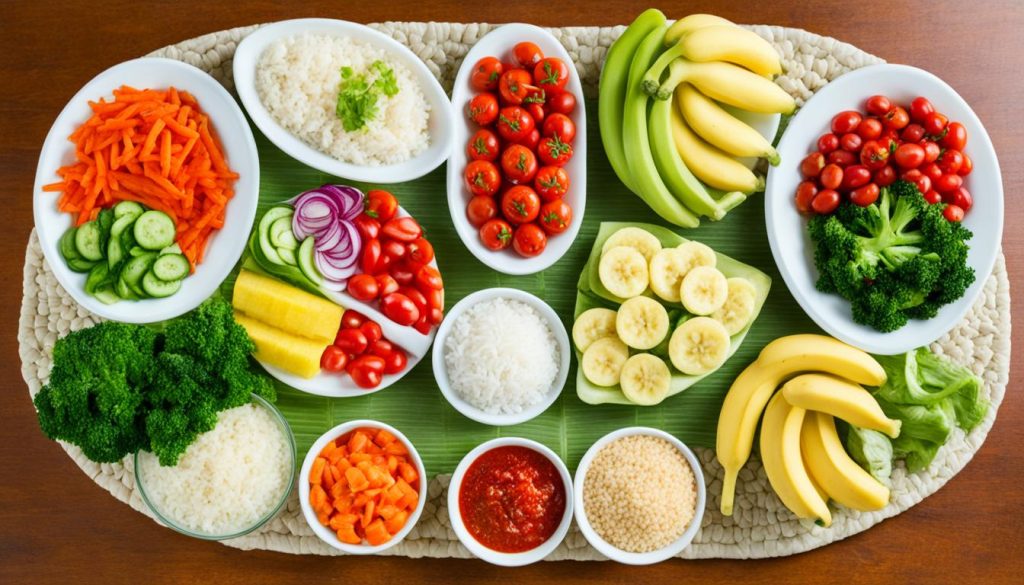
Summary of Foods to Avoid During Diarrhea:
| Foods to Avoid | Reason |
|---|---|
| Milk and dairy products | Difficult to digest and may worsen symptoms |
| Fried, fatty, and greasy foods | Irritate the digestive system and worsen diarrhea |
| Spicy foods | Stimulate the digestive system and increase discomfort |
| Processed foods with additives | Potential to upset the stomach further |
| Pork and veal | Heavy on the digestive system and may cause upset |
| Sardines | High in oily fats, which can worsen symptoms |
| Raw vegetables | High in fiber and difficult to digest during diarrhea |
| Onions | Can cause gas and bloating, aggravating symptoms |
| Corn | High fiber content can be tough on the digestive system |
| Citrus fruits | Acidic nature may irritate the digestive system |
| Pineapples, cherries, seeded berries, figs, currants, and grapes | Harder to digest during diarrhea |
Treatment and When to Seek Help
Most cases of diarrhea can be effectively treated at home with simple remedies and over-the-counter medications. The key to managing diarrhea is to address the underlying causes, alleviate symptoms, and prevent dehydration. Here are some essential steps for diarrhea treatment:
- Follow a modified diet: During a bout of diarrhea, it is important to adjust your diet to include foods that are easy to digest and gentle on the stomach. Stick to the BRAT diet – bananas, rice, applesauce, and toast. These foods are low in fiber and can help firm up stool. You can also include cooked cereal, soda crackers, and baked or boiled potatoes. Avoid foods that are greasy, fried, spicy, or high in fiber.
- Increase fluid intake: Diarrhea can cause significant fluid loss, leading to dehydration. It is crucial to drink plenty of fluids to replenish lost fluids and maintain hydration. Opt for water, clear broths, electrolyte-enhanced water, or weak, decaffeinated tea. Avoid caffeinated and carbonated beverages as they can worsen diarrhea.
- Take anti-diarrheal medications: Over-the-counter medications like Pepto-Bismol can help alleviate symptoms and reduce the frequency of bowel movements. However, it is recommended to consult a healthcare professional before taking any medications, especially if you have an underlying medical condition or are taking other medications.
While most cases of diarrhea can be managed at home, there are situations when medical attention should be sought. It is important to be aware of the following signs and symptoms that warrant medical help:
- Persistent diarrhea: If diarrhea persists for more than a few days without improvement, it is a good idea to consult a healthcare provider. Prolonged diarrhea may indicate an underlying infection or other medical conditions that require further evaluation.
- Severe symptoms: If diarrhea is accompanied by severe abdominal pain, black or bloody stools, or a high fever, immediate medical care should be sought. These symptoms may indicate a more serious underlying condition that requires urgent attention.
- Dehydration: Infants, young children, and elderly individuals are especially prone to dehydration caused by diarrhea. If a child’s diarrhea does not improve after 24 hours, they haven’t had a wet diaper in 3 or more hours, or they have a fever or other concerning symptoms, it is important to seek medical attention promptly.
In severe cases, hospitalization may be necessary to administer intravenous fluids and closely monitor hydration levels. It is always better to seek medical help if you are unsure or concerned about your symptoms.
Preventing Dehydration During Diarrhea
Dehydration is a common concern during diarrhea, especially if fluid losses are not adequately replenished. Here are some additional measures to prevent dehydration:
- Drink fluids regularly: Sip on water, clear broths, electrolyte-enhanced drinks, or oral rehydration solutions frequently throughout the day to maintain hydration.
- Avoid certain beverages: Steer clear of caffeinated and carbonated drinks, alcohol, and artificially sweetened beverages, as they can exacerbate dehydration and irritate the digestive system.
- Monitor urine output: Pay attention to your urine color and frequency. Dark-colored urine or decreased urine output may be signs of dehydration.
- Rest: Give your body ample rest to recover from diarrhea. Resting helps conserve energy and supports the healing process.
By following these guidelines and seeking medical help when necessary, you can effectively manage diarrhea and promote a speedy recovery.
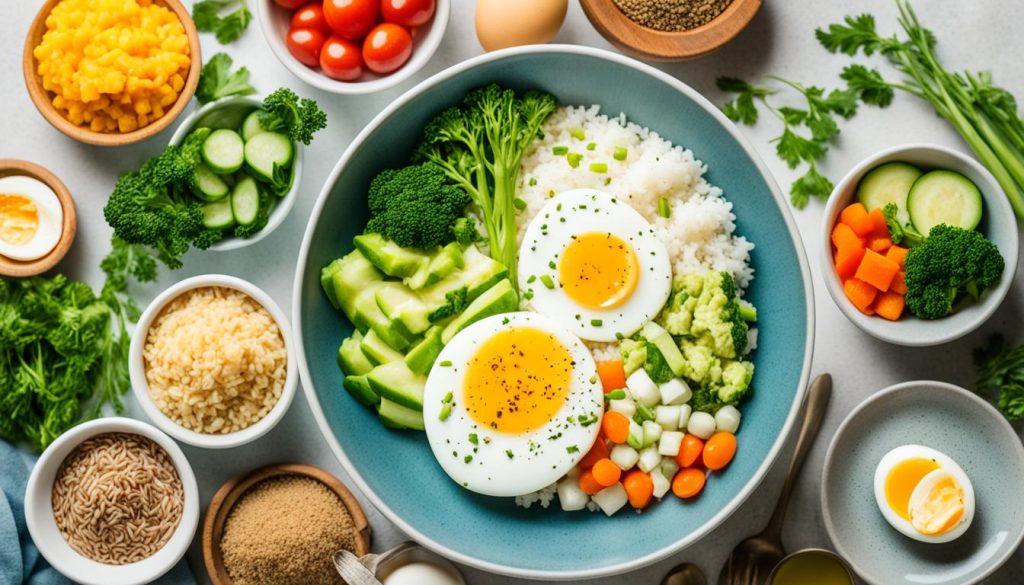
| When to Seek Medical Help for Diarrhea | Signs and Symptoms |
|---|---|
| Persistent diarrhea | Diarrhea lasting more than a few days without improvement |
| Severe symptoms | Severe abdominal pain, black or bloody stools, high fever |
| Dehydration | Infants: No wet diaper in 3 or more hours; children/adults: Dark-colored urine, decreased urine output |
Conclusion
When dealing with diarrhea, following a modified diet and consuming easily digestible foods can help soothe the digestive system and promote a quicker recovery. The BRAT diet, which includes bananas, rice, applesauce, and toast, is a commonly recommended diet for diarrhea, providing bland and binding foods that can help firm up stool. Additionally, including cooked cereal, soda crackers, and baked or boiled potatoes can provide relief and comfort during this period. It is crucial to stay hydrated by drinking plenty of fluids like water, clear broths, and weak, decaffeinated tea, ensuring the body remains properly hydrated. To further aid recovery, it is important to avoid foods that can aggravate symptoms, such as milk and dairy products, fried and fatty foods, and spicy foods. By following a modified diet and taking necessary precautions, individuals can recover faster and return to their normal diet.
While most cases of diarrhea can be successfully treated at home, it is important to seek medical care if symptoms persist or are accompanied by concerning symptoms. Severe cases or prolonged symptoms may require medical attention, such as black or bloody stools, severe abdominal pain, or a high fever. In children, dehydration and other concerning symptoms may require urgent or emergency care. By monitoring symptoms closely and seeking timely medical attention when necessary, individuals can ensure their health and well-being. It is always better to err on the side of caution and consult a healthcare professional if any doubts or concerns arise.
In conclusion, taking the necessary steps to manage diarrhea effectively can help individuals recover faster and minimize discomfort. Following a modified diet, including easily digestible foods like those in the BRAT diet, staying properly hydrated, and avoiding foods that can aggravate symptoms are key factors to consider. By prioritizing overall health and making informed choices, individuals can navigate this temporary digestive issue with confidence and get back to enjoying a normal, healthy diet.

